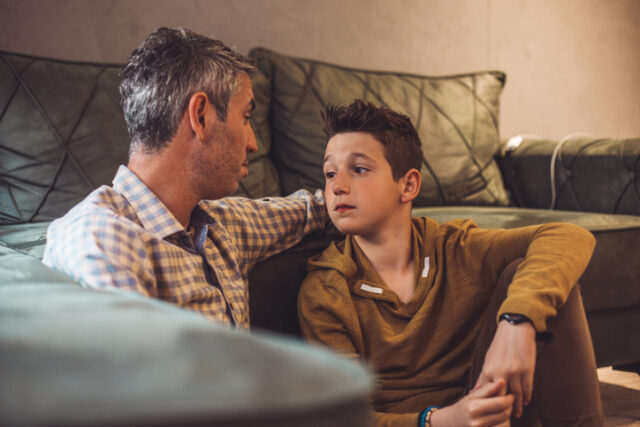You don’t have to be perfect to be a good dad — it’s all about being present, supportive, and involved in your child’s life.

Every kid deserves a father who actively shapes their future, supports their growth, and offers unconditional love, and those things should continue even when they become adults. If you want to be the kind of dad your child needs and deserves to have in life, here’s how to show the just how much they’re loved, valued, and supported. While you might not always get it right, the consistent effort you make to simply be there for them and show up as your best self will make a world of difference.
1. Be emotionally available.

It can be easy to slip into “just getting things done” mode, but being there emotionally is key. You don’t have to have all the solutions — sometimes just listening, really listening, is enough. When your kids feel like they can talk to you without being judged, they’re more likely to open up when it really matters. It builds trust and lets them know you’re a safe space for their thoughts and feelings.
2. Spend real quality time together.

This one’s huge. Kids know if they matter, and the best way to show them is by actually being there. No phone distractions, no rushing through it — just quality time. Whether it’s playing video games together, going on a walk, or just chatting about their day, these moments are what they’ll remember. They won’t care about the big stuff as much as they care about knowing you’re present in the small moments.
3. Lead by example.

Kids don’t need a lecture on what’s right — they need to see it. If you want them to be kind, respectful, and hard-working, they’ve got to see you doing those things day in, day out. The more they see you treating people with respect, making ethical decisions, and owning your mistakes, the more they’ll naturally pick up on those values.
4. Show affection regularly.

Don’t underestimate the power of a hug or a “hey, I love you.” Those small moments of affection are everything to kids, no matter how old they are. Let them know that you’re always there for them with both words and actions. It strengthens their sense of security and reminds them that they’re loved, no matter what.
5. Encourage independence.

As much as it’s tempting to want to step in and do everything for your kid, especially when they’re struggling, giving them the space to try things on their own is how they build confidence. Support them, but let them face challenges head-on. Trust that they’re capable, even if it means letting them make mistakes along the way. Those mistakes are where the real growth happens.
6. Provide guidance, not control.

It’s easy to want to control every aspect of your kid’s life — what they wear, who they hang out with, or what they do in their free time. But giving them room to make decisions helps them grow into responsible, self-reliant people. It’s about offering advice and guidance, but allowing them to have their own say and experience the consequences of their choices.
7. Be consistent with discipline.

Kids need structure. They need to know what’s expected of them, and they need to see consistent consequences when they don’t meet those expectations. The goal isn’t to be tough for the sake of it, but to create a sense of safety. They’ll learn respect for rules and boundaries, which helps them feel secure. It doesn’t mean you need to be a hard-ass — just fair and consistent.
8. Be a good listener.

Sometimes, all they need is someone to listen. Really listen. When they come to you with something on their mind, give them your full attention. Don’t interrupt, don’t rush to fix things, just listen. When they feel heard, it boosts their confidence and helps them develop strong communication skills.
9. Support their dreams and passions.

Even if your child’s interests don’t match up with yours, be their biggest cheerleader. Whether they’re into music, art, sports, or something completely unexpected, showing interest and encouragement helps them feel validated. It teaches them that their dreams are worth pursuing, no matter how out there they might seem.
10. Be involved in their education.
 Source: Unsplash
Source: Unsplash Don’t just drop them off at school and forget about it. Stay involved, even if it’s just helping with homework or showing up for parent-teacher meetings. Your involvement lets them know that their education is important to you, and it gives them the motivation to take it seriously. Plus, it gives you a chance to bond over what they’re learning.
11. Teach them respect and empathy.
 Source: Unsplash
Source: Unsplash Being a good dad means showing them how to treat other people. Talk to them about the importance of kindness and empathy, but more importantly, show them. Your actions speak volumes, and when they see you being empathetic toward other people, they’ll do the same. It’s these small lessons that shape them into kind, respectful people.
12. Encourage a sense of responsibility.
 Source: Unsplash
Source: Unsplash From doing chores to taking responsibility for their actions, teaching your kids accountability sets them up for success. Giving them age-appropriate tasks and holding them accountable for their actions teaches them that they can be trusted, and helps them develop a strong work ethic. It also gives them a sense of pride and accomplishment when they get things done.
13. Be patient and understanding.
 Source: Unsplash
Source: Unsplash Let’s face it — kids can be frustrating, even when they’re not really kids anymore. But patience is key. Whether it’s helping them with homework, dealing with a tough situation, or just waiting while they figure something out, patience helps them feel supported, not rushed. It teaches them that it’s okay to take their time and learn at their own pace, and it also lets them know you’ve got their back no matter what.
14. Build a strong relationship with their other parent.

Your relationship with their other parent is super important, too. Even if you’re not together anymore, showing respect and cooperation for each other is something your kids will notice. Healthy co-parenting teaches them the value of working together and helps them feel secure knowing both parents are involved and supportive.
15. Encourage a positive self-image.

Kids need to know they’re awesome just the way they are. Compliment them on their achievements, but also remind them of what makes them unique. Help them understand that who they are and what they bring to the table is enough. Creating a strong sense of self-worth early on sets them up for success later in life.



